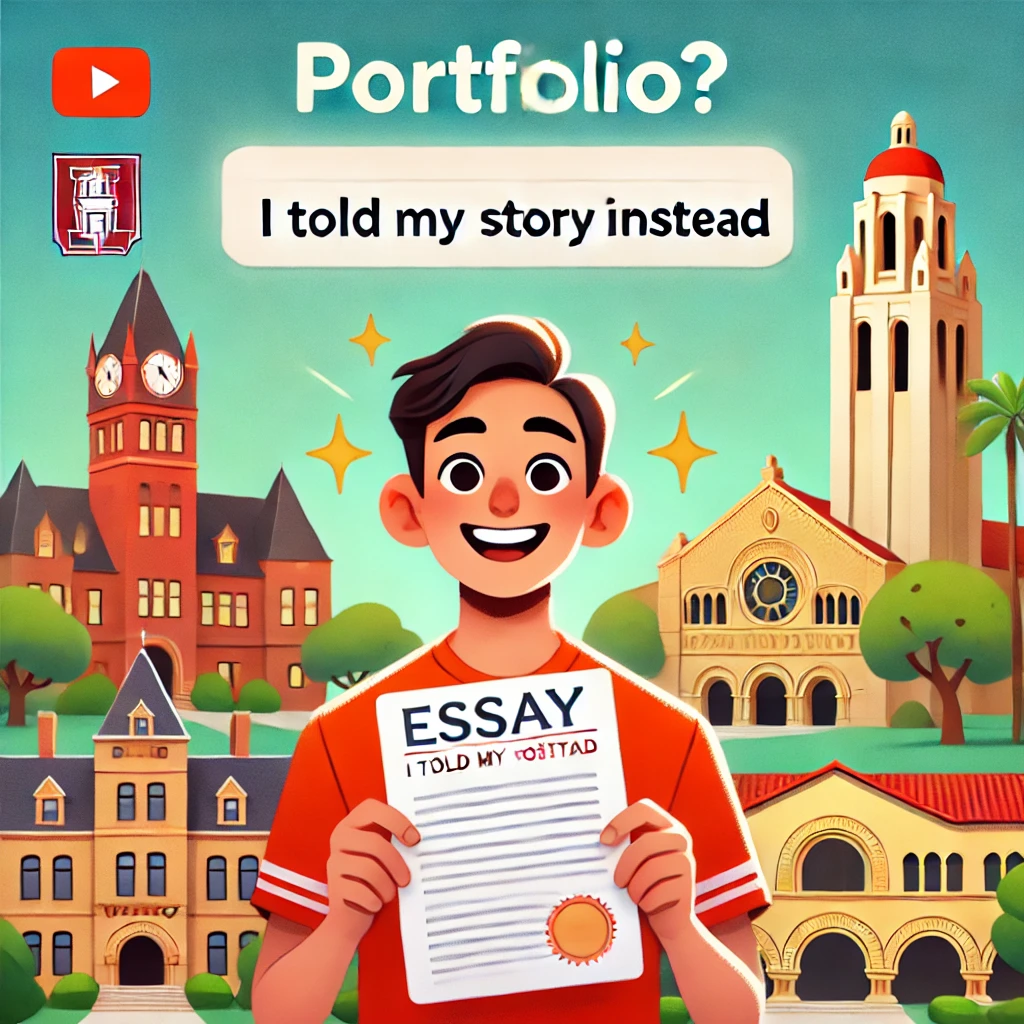하버드와 스탠퍼드에 동시 합격한 학생의 실제 자기소개서를 공개합니다. 두 학교가 어떤 차이로 에세이를 평가하고, 어떤 문장이 입학사정관의 마음을 사로잡았는지 실제 사례로 분석합니다.

“한 학생, 두 학교, 두 개의 전혀 다른 이야기” 하버드와 스탠퍼드. 누구나 가고 싶어 하지만, 누구나 같은 방식으로 도전해선 안 되는 두 학교. 한 명의 학생이 이 두 곳 모두에 합격했다면, 그가 제출한 자기소개서 안엔 분명 ‘학교별 전략의 차이’ 가 담겨 있을 것입니다. 오늘은 실제 하버드·스탠퍼드 동시 합격생의 Common App 에세이와 Supplement Essay를 중심으로, 어떤 이야기 구조였는지, 어떤 감정을 자극했는지, 어떤 방식으로 학교별 기대에 부합했는지를 입학사정관의 시선으로 분석합니다.
✅ 1. Common App Essay: 두 학교가 모두 읽는 ‘중립 에세이’

🎯 주제: “실패의 순간, 그리고 나만의 방식으로 다시 걷기”
- 합격생은 한때 영어 수업에서 발표 공포증을 겪었고, 이를 극복하기 위해 학교 팟캐스트 팀을 창립해 진행자로 나섰던 경험을 에세이로 풀었습니다.
✅ 하버드 사정관이 본 포인트
- ‘언어의 깊이’와 ‘사유의 탄탄함’을 느낄 수 있는 문장력
- 실패→탐색→성장으로 이어지는 구조적 명료성
- 사회적 영향보다 개인의 내면 변화에 초점을 맞춘 서사
✅ 스탠퍼드 사정관이 본 포인트
- “학생이 직접 팟캐스트를 창립하고 운영했다”는 창의적 실행력
- 실패에 대한 솔직함 + 행동 중심의 극복 방식
- 리더십보다는 문제를 해결하려는 에너지에 주목
✍️ Common App Essay (Title: Voice in the Void)
The first time I was asked to speak in front of my 10th-grade English class, I froze.
I stared down at the floor for what felt like an eternity. My palms were damp, my heartbeat was frantic, and my voice—completely gone.
It hadn’t always been this way. I used to love telling stories. But after bouncing between schools, losing a sense of belonging, and constantly worrying about being misunderstood, I slowly silenced myself.
Still, I didn’t want that silence to win.
So instead, I found a way to speak without standing in front of a room. I pitched an idea to start my school’s first student-run podcast. I began recording interviews with classmates on identity, anxiety, and resilience—things I was too afraid to say out loud, but somehow found clarity through editing and producing.
And somewhere between microphones and messy audio cuts, I found my voice again.
The podcast took off, and so did I.
Eventually, I stood on stage at a school assembly—not as the girl who sat in the back hoping not to be called on, but as the host of our most-followed show.
For me, this wasn’t about “overcoming” fear.
It was about learning to work with it.
I realized that my silence hadn’t meant weakness. It had been a signal—an internal tug, asking for space and understanding.
Storytelling, I’ve learned, isn’t always about volume.
Sometimes, it’s about crafting spaces where others can feel heard too.
I still stumble.
But now, I don’t run from silence.
I pause. I breathe. And then I speak—not perfectly, but deliberately.
And that voice? That’s mine now. I carry it everywhere.
💡 교훈: Common App 에세이는 ‘나 자신’에 대한 본질적 질문에 답하는 공간이며, 누구나 공감 가능한 인간적인 스토리가 중요합니다.
✅ 2. 하버드 Supplement Essay 분석: “지성, 그리고 깊이 있는 인간성”
🎯 주제: "왜 나는 '침묵의 순간'을 공부 주제로 삼았는가"
- 학생은 고등학교 윤리 수업에서 침묵과 윤리적 책임의 상관관계를 주제로 발표하며 느꼈던 감정, 그리고 이 주제에 대해 탐구를 이어간 과정을 작성했습니다.
✅ 핵심 포인트
- 철학적 주제를 자신만의 경험과 연결한 독창적 관점
- 대입 에세이에서 흔치 않은, 비판적 사고력을 바탕으로 한 글쓰기
- 책, 강의, 대화 등 다양한 자료와 연결한 지적 레퍼런스
✍️ Harvard Supplemental Essay (Title: On Silence and Ethics)
In ethics class, we were discussing the bystander effect—the idea that good people often fail to act in the face of injustice.
Our teacher posed a question: “Is silence a form of violence?”
I didn’t raise my hand. But the question followed me home.
I began reading Viktor Frankl, then Elie Wiesel. I watched documentaries on the Nanking Massacre, the civil rights movement, and current events in Korea. I wasn’t searching for one clean answer—I was listening for echoes.
Eventually, I wrote an essay titled The Weight of Quiet.
In it, I explored silence not just as absence, but as a conscious decision—one that often carries its own moral weight.
Later, I presented my findings in class. I wasn’t trying to be bold or provocative.
I simply needed to voice what had been circling in my head:
“Is our silence always passive—or can it sometimes make us complicit?”
That project became more than just a grade.
It was the moment I understood that philosophy doesn’t live in books alone.
It lives in questions we’re not always ready to answer.
At Harvard, I hope to keep asking those difficult questions.
And more importantly, I want to learn how to sit with the discomfort they bring.
💡 하버드는 ‘질문을 품고 깊이 고민하는 학생’을 좋아합니다. 이 에세이는 “사유하는 힘”을 잘 드러냈습니다.
✅ 3. 스탠퍼드 Supplement Essay 분석: “실패와 도전, 그리고 유머”

🎯 주제: “가장 좋아하는 말은?” / “기억에 남는 실패는?” 등 짧은 문항
- "가장 좋아하는 말은 ‘언젠가’입니다. 지금은 아니어도, 언젠가 할 수 있다는 말이라서요."
- "실패: 첫 창업 앱이 다운로드 12건에서 끝났을 때. 엄마 폰 포함입니다."
✅ 핵심 포인트
- 자기 자신에 대한 깊은 이해 + 겸손한 유머
- 실패를 회피하지 않고, 실패의 경험을 창의적으로 재해석
- 짧은 글에서도 목소리(Voice) 가 분명함
✍️ Stanford Short Essays
1. What is your favorite quote and why?
“Someday is not a day of the week.”
I used to say things like, “Someday I’ll build that app,” or “Someday I’ll finally start that blog.”
Then one afternoon, I scribbled “someday” on a sticky note and stuck it to my mirror.
That same week, I signed up for my first hackathon. I pitched an idea. It flopped—spectacularly.
But that was also the week I stopped waiting.
Now, whenever I catch myself saying “someday,” I remember:
Hesitation has a cost. And I’ve paid enough already.
2. Tell us about a meaningful failure.
My first mobile app was a positivity-sharing platform meant to spread anonymous encouragement.
It got twelve downloads. Eleven were my own test accounts. The twelfth? My mom.
But in that “failure,” I learned more than I ever had from success.
I picked up UI design, basic marketing, user testing, and the pain of debugging until 2 a.m.
Most of all, I learned that waiting for perfection holds you back.
The app flopped.
But I started building.
And I haven’t stopped since.
💡 스탠퍼드는 ‘미래의 가능성을 가진 인간’을 봅니다. 이 학생은 ‘완성된 사람’보다 ‘열려 있는 사람’으로서의 매력을 잘 보여주었습니다.

“합격의 비밀은 점수가 아니라 ‘스토리’에 있다” 하버드는 글을 ‘깊게’ 읽고, 스탠퍼드는 글을 ‘다르게’ 읽습니다. 두 학교 모두 공통된 점은 단 하나: 당신의 진짜 이야기, 그리고 그 안에 담긴 감정과 의지에 반응한다는 것.
- 학점은 비슷할 수 있습니다.
- SAT 점수도 넘칠 수 있습니다.
- 활동 목록은 거기서 거기입니다.
- 그러나 단 하나, 📌 당신의 글은 당신만 쓸 수 있어야 합니다.
이제 여러분의 차례입니다. 당신만의 실패, 도전, 감정, 그리고 생각을 누구도 흉내 낼 수 없는 방식으로 풀어낼 차례입니다. 그것이, 명문대 입학의 문을 여는 ‘이야기의 열쇠’입니다.

